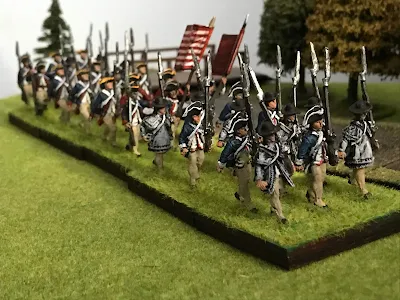From a recent discussion on the Fife and Drum miniatures forum. The question was asked how prepared were the British for the raid on Concord on April 19, 1775? I though that this item has a really good insight into British intelligence. While the actual orders General Thomas Gage gave to Lieutenant Francis Smith have been repeated and republished numerous times the actual draft of the orders have not. They are much more detailed about the items they were sent to destroy, where they were hidden and how to dispose of them. I thought some of the readers here may be interested in reading this document so I transcribed it From the original in the Gage Papers at the University of Michigan.
From the draft of Gate's orders to Smith:
"Sir, a quantity of ammunition and provision together as number of cannon and small arms having been collected at Concord for the avowed purpose of raising a rebellion against his Majesty 's Government, you will match with the corps of Grenadiers and Light Infantry put under your command with the utmost expedition and secrecy to Concord, and where you will seize and destroy all the artillery and ammunition, provisions, tents and all other military stores you can find you will knock off one trunnion at least of each of the iron guns and destroy the carriages and beat in the muzzles of the brass ones so as to render them useless. The powder and flour may be shaken out of the barrels into the water, the tents burnt and the men may put the balls and lead into their ( knapsacks crossed out) pockets throwing them away by degrees as they go into fields and ditches ponds and etc. (When you shall crossed out) you have a plan (a return crossed out) Which is marked off the places where the artillery and ammunition is reported to be lodged, and after destroying the same you will return, and if your men appear much fatigued you may lodge them at Lexington or Cambridge and let them rest in barns or other outbuildings and may (get crossed out) hire waggons at Lexington for weak and fatigued men. If any body of men dares to (attack is crossed out) oppose you with arms you will warn them to disperse (and crossed out) or attack them.
Four brass cannon and two mortors or cohorn with a number of small arms in the cellar or out houses of Mr Barrett a little on the other side of the bridge where is also lodged a quantity of powder and lead.
Ten iron cannon before the town house and two within it which town house is in the center of the town. The ammunition for said guns within the house.
Three guns of 24 pounders lodged in the prison yard with a quantity of cartridges and provision.
A quantity of provisions and ammunition in other places, the principal deposits are the houses of Mr Hubbard, near the meeting Butler, Jones the tailor near the Hubbard's, two men of the rear of (ineligible) Bonds, and particularly at the entrance of the town, at a house plaisteted white a small fence in front and divergence a large quantity of powder and ball is reported to be deposited in his store adjoining the house.
Cannon hid in the wood a mile and half from the center of the village between the river and Malden pond. The wood thick, a good deal of Underwood. The ground no little wet but not a marsh. Three guns still mounted, the rest dismounted and carefully hid and even buried. In the same place some boxes of arms hid like the cannon.
The medicine chests and powder barrels, tents and etc distributed in the chief houses, particularly Mr Barrett's, Captain Wheeler's , Mr Hubbard's stores and the two Bonds. The three guns in the prison court remain their beside many different articles. "















